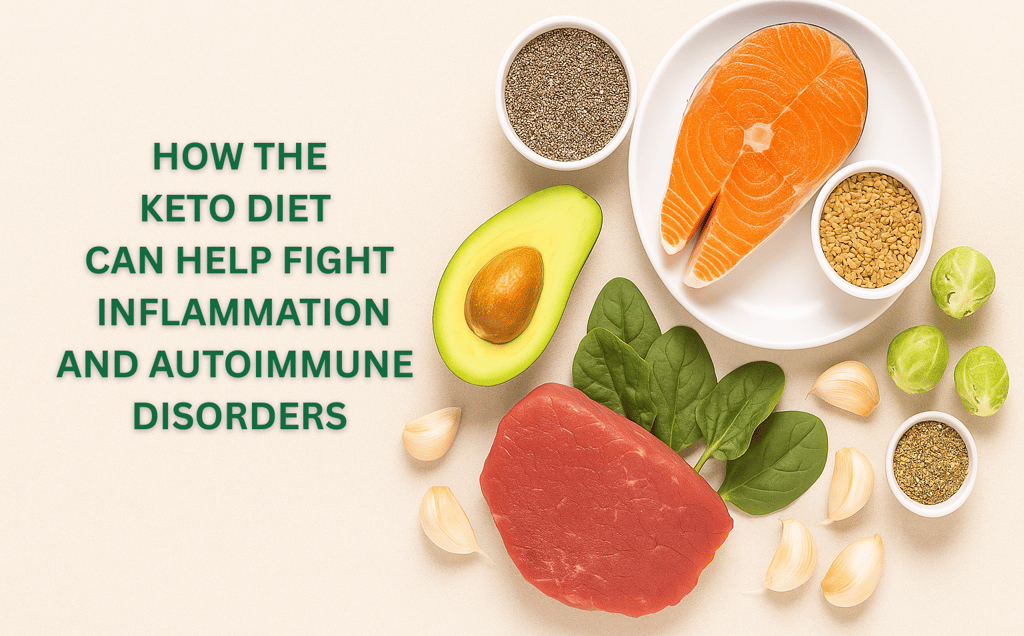Keto for Inflammation: How a Low-Carb Diet Can Help Autoimmune Conditions
Discover how the keto diet may reduce chronic inflammation and ease autoimmune symptoms. Learn which anti-inflammatory keto foods to eat, what to avoid, and how to build a healing meal plan.
INFO AND TIPSBLOG
6/3/20253 min read


How the Keto Diet Can Help Fight Inflammation and Autoimmune Disorders
If you struggle with chronic inflammation or an autoimmune condition like rheumatoid arthritis, Hashimoto’s, or lupus, you've probably searched for relief beyond prescription medications. What you eat may have a bigger impact than you think—and that’s where the ketogenic diet comes in.
The keto diet isn’t just a trendy way to lose weight; it’s increasingly being studied for its anti-inflammatory benefits, especially for those with autoimmune diseases. In this post, we’ll explore how keto works against inflammation, what foods to focus on, and how to customize the diet to support your autoimmune health.
What Is Inflammation?
Inflammation is your body’s natural response to injury, infection, or harmful stimuli. In the short term, it’s helpful—it signals your immune system to heal and defend. But chronic inflammation is another story.
When inflammation becomes long-lasting, it can contribute to a wide range of health issues including:
Joint pain
Fatigue
Brain fog
Digestive problems
Skin flare-ups
Increased risk of disease
Autoimmune diseases involve an overactive immune system mistakenly attacking healthy tissues, which keeps inflammation levels high. Conditions like:
Rheumatoid arthritis
Lupus
Multiple sclerosis
Hashimoto’s thyroiditis
Psoriasis
Celiac disease
…all involve inflammation at their core.
How the Keto Diet Fights Inflammation
The ketogenic diet is high in healthy fats, moderate in protein, and very low in carbohydrates (typically under 20–50 grams per day). This pushes your body into a state of ketosis, where it burns fat for fuel instead of carbs.
Here’s how keto may reduce inflammation:
1. Lowers Blood Sugar and Insulin Levels
High-carb diets spike blood sugar, which increases insulin—a hormone linked to inflammatory pathways. Keto stabilizes blood sugar and reduces insulin resistance, which is critical for people with autoimmune or inflammatory disorders.
2. Reduces Inflammatory Cytokines
Research shows that ketones (especially beta-hydroxybutyrate or BHB) produced during ketosis suppress pro-inflammatory cytokines—chemical messengers that worsen autoimmune flares.
3. Supports Mitochondrial Health
Mitochondria are the energy factories in your cells. Dysfunctional mitochondria = more oxidative stress and inflammation. Keto supports mitochondrial function and protects against oxidative damage.
4. Improves Gut Health
A low-carb diet like keto often reduces foods that feed harmful gut bacteria, potentially lowering intestinal inflammation—a key trigger in many autoimmune diseases.
5. Promotes Weight Loss
Excess fat tissue, especially around the abdomen, promotes chronic inflammation. Losing even a small amount of weight can reduce inflammatory markers.
Best Keto Foods to Combat Inflammation
Focus on whole, nutrient-dense keto-friendly foods that naturally reduce inflammation:
✅ Anti-Inflammatory Fats
Extra virgin olive oil
Avocados & avocado oil
Wild-caught salmon & sardines (rich in omega-3s)
Flaxseeds & chia seeds
Walnuts & macadamia nuts
✅ Low-Carb Veggies
Spinach, kale, and arugula
Cauliflower, broccoli, Brussels sprouts
Zucchini, cucumber, bell peppers
Fermented vegetables like sauerkraut and kimchi
✅ Clean Proteins
Grass-fed beef
Organic poultry
Pasture-raised eggs
Bone broth (great for gut and joint health)
✅ Anti-Inflammatory Spices & Herbs
Turmeric
Ginger
Garlic
Rosemary
Oregano
Foods to Avoid on a Keto Anti-Inflammatory Plan
Even within a keto diet, some foods can still trigger inflammation—especially in autoimmune sufferers:
❌ Processed Meats
Deli meats, hot dogs, bacon with additives
❌ Dairy (if sensitive)
Some people with autoimmune issues are sensitive to casein or lactose. Try eliminating dairy to test your response.
❌ Artificial Sweeteners
Sucralose, aspartame, and sugar alcohols can irritate the gut
❌Seed Oils
Canola, soybean, sunflower oil—all high in inflammatory omega-6 fats
❌ Nuts/Seeds (in excess)
Too many omega-6-rich nuts like almonds or peanuts can throw off your fatty acid balance
Customizing Keto for Autoimmune Conditions
Keto is not one-size-fits-all, especially when managing autoimmune disease. Try these personalized strategies:
Consider a Dairy-Free Keto
Dairy can be inflammatory for some. Swap cheese and cream for coconut milk, nutritional yeast, or dairy-free keto sauces.
Use Targeted Supplements
Autoimmune patients may benefit from:
Omega-3 fish oil
Curcumin (turmeric extract)
Vitamin D
Magnesium
Collagen peptides
(Always talk to your doctor first.)
Track Your Symptoms
Keep a journal of food intake, energy levels, pain, or flare-ups to identify possible triggers or improvements.
Focus on Gut Healing
Include gut-friendly foods like bone broth, collagen, fermented veggies, and limited fiber if you have issues like SIBO or IBS.
Sample One-Day Anti-Inflammatory Keto Meal Plan
Morning:
Drink: Warm lemon water with apple cider vinegar
Breakfast: 3 eggs scrambled in olive oil with spinach and turmeric, avocado slices
Midday:
Lunch: Grilled salmon on a bed of mixed greens with cucumber, olive oil, and lemon vinaigrette
Drink: Green tea or bone broth
Snack:
A few macadamia nuts + 1 tbsp coconut oil blended into herbal tea
Dinner:
Grass-fed beef stir-fried with broccoli, mushrooms, and garlic in avocado oil
Side of roasted Brussels sprouts
Evening Support:
Magnesium glycinate supplement
Optional: Chamomile tea
FAQs: Keto & Inflammation
Can keto cure my autoimmune disease?
No, but it may reduce symptom severity and flare-ups by lowering inflammation and improving immune function.
How long until I see results?
Many report reduced joint pain, clearer skin, or better digestion in as little as 1–2 weeks. Long-term results improve with consistency.
Is strict keto required?
Not always. Some people thrive on low-carb or cyclical keto. The key is blood sugar stability and eating anti-inflammatory foods.
Final Thoughts
If you're battling inflammation or an autoimmune condition, the keto diet offers a science-backed strategy to reduce discomfort, stabilize energy, and regain control of your health. Start with simple, whole foods, focus on gut healing, and be patient as your body adjusts.
You don’t need to be perfect—just consistent. Small, sustainable changes can make a massive difference in how you feel.
📌 Save this post or share it with someone who could benefit from keto for inflammation relief.
Explore delicious keto recipes and diet tips.
Diet
Disclaimer: Keto With Me participates in the Amazon Services LLC Associates Program, an affiliate advertising program designed to provide a means for sites to earn advertising fees by advertising and linking to Amazon.com.
ketowithme@ketowithme.net
© 2025. All rights reserved.
Health
